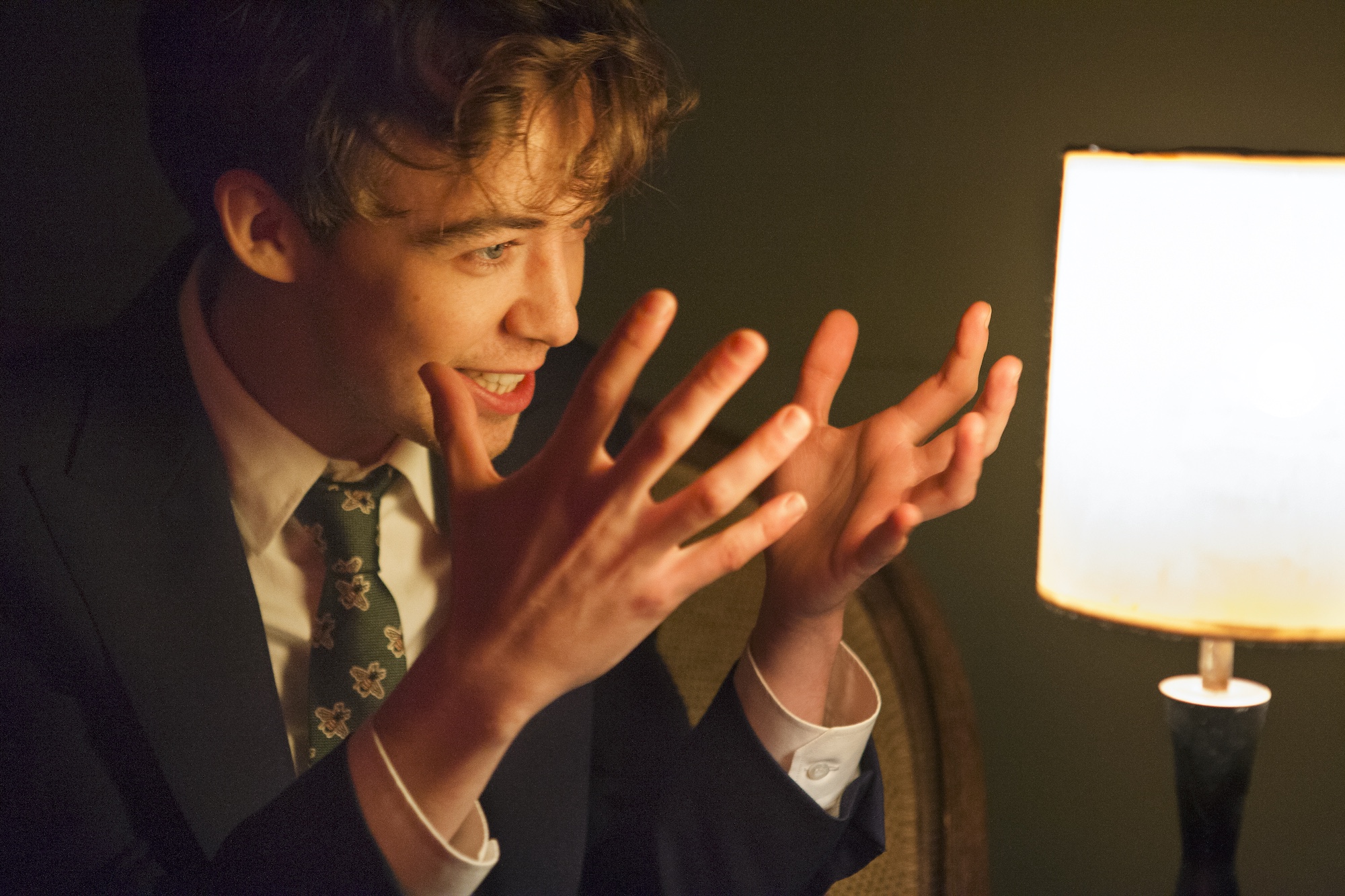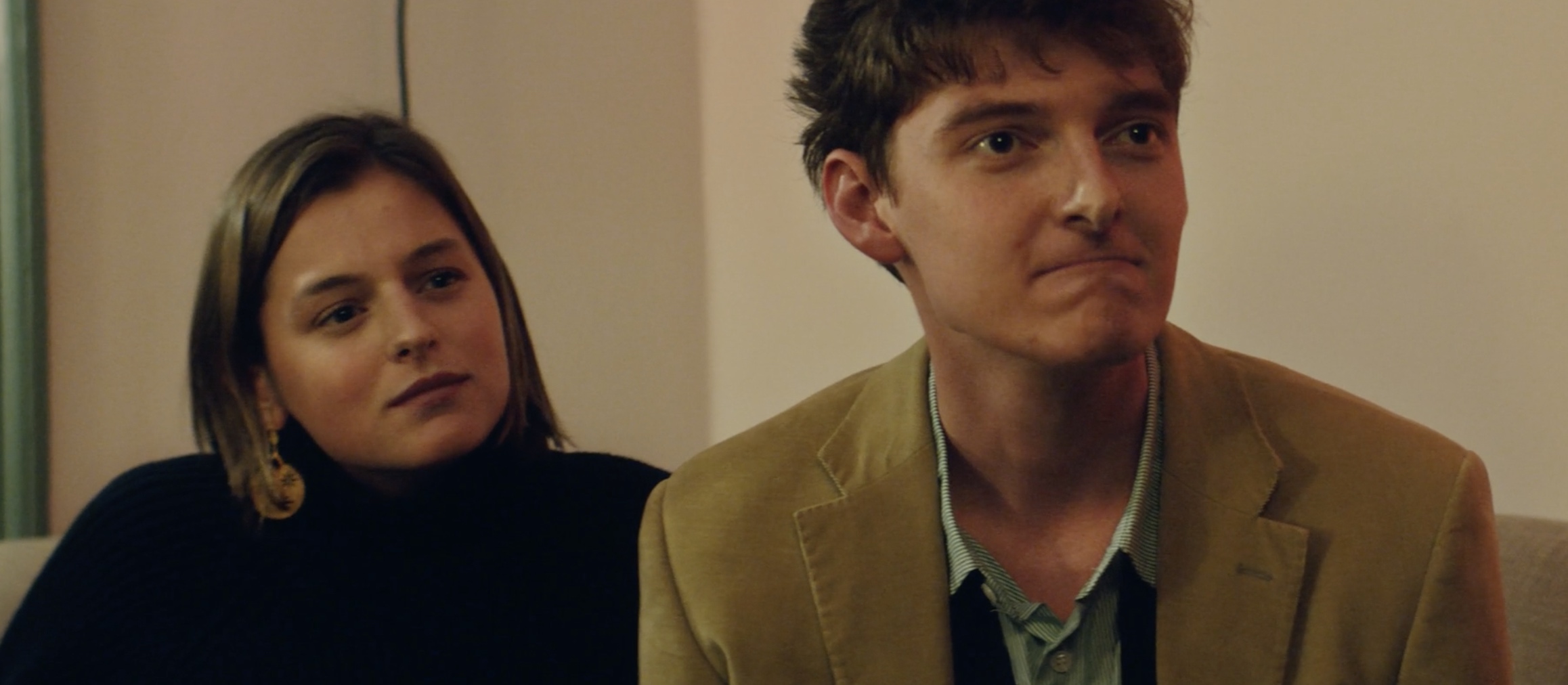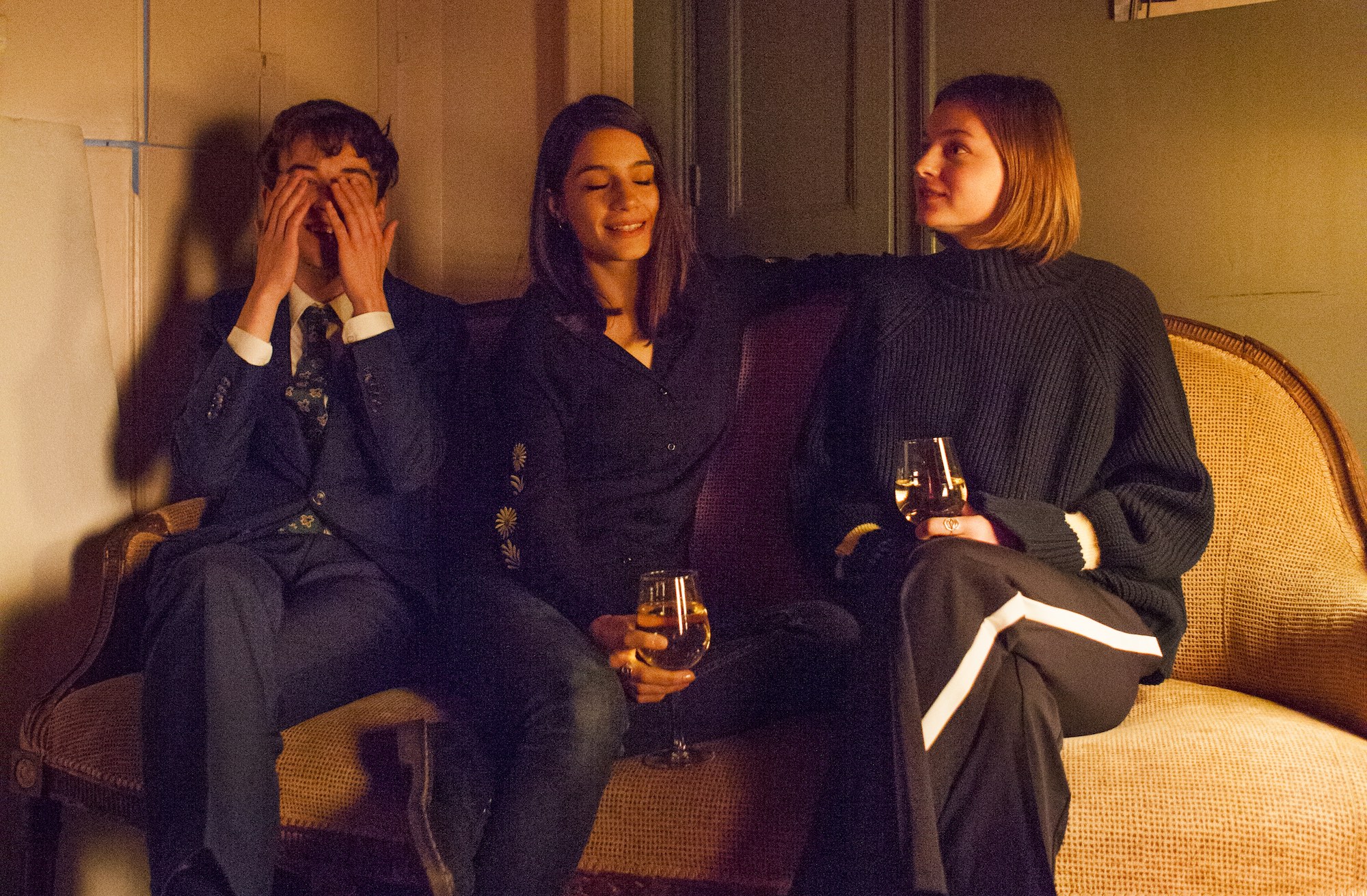After a private premiere in collaboration with British mental health charity CALM, Jack Cooper Stimpson’s Alex’s Dream had its official online release with Short of the Week today. A short with an attention-grabbing cast, we took the opportunity to talk to the 24-year old writer/director about the process of making a short film with recognisable faces, including Alex Lawther (The End of the F***ing World, The Imitation Game) and Emma Corrin (The Crown, Pennyworth).
Revealing how he got rising film and TV actors to star in his first narrative short and his reasons for breaching out from acting to writing and directing, Stimpson offers advice for fellow burgeoning filmmakers, who are looking to cast stars such as Emma Thompson in their next short film.
You and Alex [Lawther] were flatmates while you wrote the script for Alex’s Dream and the character is obviously called Alex. How did you know each other? Did you write the role with him in mind?
Yes, we were living together at the time. We worked together on a film called Old Boys, which was a British feature film that came out in 2018.
Were you acting in that film?
I acted in that film, yes. Alex and I were in that film together and had great fun. And then we moved in together after the film. And, you know, Alex was off doing The End of the F***ing World. His career was really taking off at that point and he was doing such exciting work. And I was still acting, but also starting to think about writing/directing more seriously, because I’d sort of produced for other people and have done a bit of that kind of work. But I realized that some of the work I was producing, I wasn’t necessarily a big fan of it. I was just kind of going through the motions a bit with it. So I wanted to try to write and direct.

Alex Lawther on the set of Alex’s Dream.
Alex was very encouraging of that and we spent many days and nights talking about the idea and he sort of said, “You should go for it. But be weirder, go and really push the boat out with it.” And then it comes to the awkward moment where you have to be like, “Oh, by the way, do you want to be in this?”
Luckily, he thought it sounded like fun and he’d love to do it. So yes, it was very much written for Alex. I try not to write with people in mind too much. But you know, it’s a no-brainer when you’re close with someone like Alex, because he’s just such a fantastic actor, and he has a really good knowledge of cinema.
I think, if you’re proposing really big, bold things to him, like, “Oh, yeah, by the way, you’re going to be talking to a dog, and then you’re going to end up on a fishing boat“, he’s not going, “Oh, is this gonna make me look a bit stupid? Instead he’s going, “That’s going to work, I can see how this is going to work”, and he’s already figuring it out.
Do you consider yourself more of a writer/director by now or do you still see yourself as an actor as well?
I definitely still consider myself both. I think being a multi-hyphenate is fantastic. It’s what I enjoy doing. And I don’t want to kind of limit myself just yet. I mean, I’m doing so much writing and directing right now that I consider myself that primarily at the moment, and I’m so excited to ride that train as far as it goes and to see what happens.

Alex Lawther, Simon Manyonda, Emma Corrin, Jack Cooper Stimpson and Sam Hayharth on the set of Alex’s Dream.
At the end of 2018, I shot a TV series called World on Fire, which was a quite large scale BBC One, WWII drama, and I had a very small part in it. It should have been a really exciting thing to be doing that, but I just felt I felt like I wanted to be doing the writing/directing more at that point in time. So I had to think really honestly and really hard about it to kind of say, “Where do you want to put the attention for next year? What do you want to do?”
I know this sounds so pretentious, but this is the easiest way to say it: I consider myself a filmmaker. And I think being a filmmaker is acting, writing, directing and watching films; it’s everything. I just love every element of it, really, so it sort of makes sense to be doing a bit of everything. But I think for now, the writing and directing will take up 90% of my time. I started working in this industry quite young. I started when I was 16. I’ve been around sets and around this for a little while and you know, directing is a huge step up and it was a big, bold learning curve, but it felt like the right time to do it.
The entire cast of your film has really impressive credits to their name, especially Alex and Emma [Corrin]. Did you know all of them beforehand as friends, or did you just pick the rising talents in British film and TV? How did the casting come about?
I knew Alex, Emma and Simon [Manyonda]. Those were the three people that I knew, personally as friends, prior to shooting. I mean, this was the first film that Emma shot. She hadn’t done anything before this. She had done a couple of short films when she was at university, I think, but this was like the first thing that she had done as a paid job. We were very good friends at the time. So it was a real pleasure to have her on board and to have her trust and to have everyone’s trust.

Emma Corrin and Sam Haygarth in Alex’s Dream.
Sam [Haygarth], who plays Archie in the film, who is sort of Alex’s best friend, the very tall guy in the corduroy suit, has now become my right writing partner. We wrote a short film last year called Extinction together, which was about a group of climate activists. And that got picked up for a series by the BBC. So we’re writing that together. Which is crazy, because Sam auditioned for the film, and he’s now become my working partner. So it’s very sort of serendipitous and has a touch of fate about it.
Obviously, Alex was quite established by the time we shot the film, people knew who he was, he had done Black Mirror and things of that nature. We were very lucky with the casting really, and just very lucky that people have blossomed in the way they have. It’s very exciting to see what everyone’s doing now. But a bit of chance, basically.
So you have all these actors going on to do bigger things: The Crown, The End of the F***ing World, and you yourself working on your own BBC show at 24! How does it feel when friends get to this level of success? And I guess my question would be for aspiring filmmakers, how much would you say was just luck and good timing? How much did your previous experiences help?
Hmm, that’s a really good question. I think there’s huge focus with short films to get big talent, because it feels like a really obvious way to get attention as it’s a very simple exchange of, “Well, people know who this person is, therefore, they want to watch the film.” And we all have to acknowledge that, we all have to use that. Of course, the people who get attention also tend to be pretty good at their job for the most part. So it’s fine. It’s a system that kind of works out, I think, for the most part.
“I think there’s huge focus with short films to get big talent.”
It’s difficult when people assume that I just wanted Alex to do this because he had a following, because he was well known or whatever, because he’s a friend. For me, shooting my first film, I can’t think of anyone better to work with because he has that trust, he knows me very well. He knows what I wanted to do there. So actually, it’s sort of a marriage of lots of different things.
At the same time, it would be naive to ignore the fact that it really helps and of course, Emma’s trajectory afterwards has been like a steep curve. It’s great. Are we releasing the film at this point of time to catch The Crown wave? Yeah, of course we are. Because we want people to watch the film. And that’s done marketing. You can’t feel bad about that. It’s a strange thing, but one would really have to remind yourself to not focus on the talent side of it too much. You’ve got to find the right people for the job.

Alex Lawther, Olivia Popica and Emma Corrin on the set of Alex’s Dream.
I’ve been very lucky. The second short film I directed last year, Extinction, had Emma Thompson in it. Who is obviously a huge talent. She’s a two time Academy Award-winning actress and that’s been a huge door opener.
How did you get Emma Thompson to act in your short?
Well, the film is about a group of climate activists. It’s basically about Extinction Rebellion, the protest group. And, of course, Emma Thompson has been a long term advocate for climate policy. She is an activist, plain and simple. She was getting involved with Extinction Rebellion, so when Sam and I were writing the film together, we kind of dreamed up this idea where we thought, wouldn’t it be fantastic if Emma Thompson got involved. And we managed to get the script to her and she agreed to come on board. She was right for the film: if you want someone to play a climate activist, who better than a climate activist.
You got Emma Thompson for your short Extinction because of the topic of the film, and you couldn’t have anticipated Emma Corrin’s success. So if we’d want to break it down, getting actors is about writing a good script and trusting in your collaborators and them trusting in you. Right?
I think you’ve put that really well. It’s still a process with casting and I think you have to look at all the options, but of course, you should go with your instincts on it. And these were people that I knew really well and cared about, and they really cared about me, so it felt like a very natural thing to do. They were also invested in the project, it was very collaborative.
I don’t think you can try and anticipate these things too much. I think if you can cast fantastic actors in your film, that’s great. But you’ve got to make sure that the script’s great already. If you’ve got a bad script, having a good actor doesn’t balance that out.
If you were offering advice for fellow short filmmakers, do you think there’s a way to approach these kinds of actors? Is it just getting through their agent? I mean, as you said, if you don’t have a script that’s good enough, you wouldn’t even get those actors.
It’s a really complicated thing. All these actors are very kind of guarded when they get to a certain level, because they receive a lot of scripts, but that doesn’t mean you’ve done anything wrong by wanting to send the script to them. I think that’s an important thing to remember: if you are making the films for the right reason, and you feel like that actor is the right person for that, then you shouldn’t feel apologetic about that, or like you’re wasting people’s time. Actors should want to work and they should want to be involved with exciting projects.
They need you as much as you need them and that’s the important thing to remember. I think you need to instil that belief in yourself before you can go out and start sending work out. I’d say, if you have an actor in mind who has a profile and is going to be quite a big get, you need to be really prepared for that. Once you send that script off, there’s no going back from that, you can’t ask to send another draft. I think it’s about finding the right time in the project to do that.
“There’s a democracy to making short films”
I don’t need to tell you, you work for Short for the Week, you understand this, but short films is such an important platform. People still kind of look down their noses at them slightly, in some circles. It’s all a bit, “Everyone’s making short films.” But that’s the fantastic thing, that there’s a democracy to making short films. Every filmmaker has made short films at some point. So I don’t think we should be too snotty about them, or too judgmental.
I think that’s really inspiring advice. Has Alex’s Dream already helped you in your next steps? Or was everything already moving along before the short film?
Oh, no, no, it was definitely a game-changer in opening lots of doors for me. Definitely. As I said, I met Sam through the film and that was a huge thing for me personally. Sam was also an up-and-coming actor, and writer as well, so we were at a similar level at that point. Now we’ve got our first television commission and that’s been a huge step forward. It also helped me get my first writing and directing agent. That wouldn’t have happened without Alex’s Dream.
It’s also been a good conversation starter. For me, it really built my confidence and it’s really made me feel like this is possible. This is something I can do and I want to do.
Parts of the interview have been edited for brevity and clarity.
All photos and behind-the-scenes shots by Cecilie Harris. Most set photos have been cropped to fit in with our page formatting.
 Georg Csarmann
Georg Csarmann